Overview of Northern Ireland
Photo credit: Guliolopez
To the southeast lie some of Ireland's loveliest landscapes in the Kingdoms of Down, a region recognised worldwide as an Area of Outstanding Natural Beauty. County Down combines miles of spectacular coastline with fishing villages, seaside resorts, loughs, forests and the Mountains of Mourne. To the north is the dramatic Antrim coastline with its soaring cliffs, unblemished beaches, and the magnificent, glacier-carved Glens of Antrim. Among the unusual rock formations glimpsed from the coastal road, none is stranger or more memorable than the famous Giant's Causeway, the legendary tourist attraction that is fabled to be the highway built by giant Finn McCool, to bring his lady love to Ulster from an island in the Hebrides. This UNESCO World Heritage Site is a mass of thousands of basalt columns tightly packed together to form stepping stones leading from the foot of the cliffs into the sea.
The gateway to the northwest is the historic walled city of Londonderry, or Derry, a city popularly home to poets and storytellers, which hosts plenty of live music and festivals, and is a centre of culture and creativity. Across the Sperrins is the city of Belfast, surrounded by hills and a wealth of industrial sites, such as old linen and corn mills that are a reminder of Northern Ireland's industrial heritage. Belfast played a significant role in the Industrial Revolution and the development of its manufacturing businesses quickly turned the 17th-century village into a robust metropolis that today is home to a third of the country's population and some wonderful architecture.
With its green hills, rivers and lakes, mountains and spectacular coastline, Northern Ireland is the perfect setting for many outdoor activities, while in the towns and villages, visitors will undoubtedly be invited to join in the craicor good fun, centred on a traditional Irish music session and a pint or two of the black stuff.
Key Facts
- Language:
- English is the official language, though visitors will be astonished by the variety of regional accents.
- Passport/Visa:
If a visa is not required, travellers should hold a return or onward ticket, or proof of funds for the duration of stay. Passports must be valid for the period of intended stay in the UK; nationals of the EU require a passport valid on arrival. It is highly recommended that travellers' passports have at least six months' validity remaining after the intended date of departure from their travel destination. Immigration officials often apply different rules to those stated by travel agents and official sources. For visitors who are visa exempt up to a maximum stay of 6 months, the period of stay will be determined by the Immigration Officer on arrival.
- Currency:
The currency is the British pound (GBP), which is divided into 100 pence. ATMs are available in almost all towns and Visa, MasterCard and American Express are widely accepted. Foreign currency can be exchanged at bureaux de change and large hotels, though better exchange rates are likely to be found at banks.
- Electricity:
- The electrical current in the UK is 240 volts, 50Hz. Flat, three-pin plugs are standard.
Travel Advisories
Travel to Northern Ireland
Climate
Ireland has a temperate oceanic climate, with weather that is generally mild, wet and changeable. Northern Ireland enjoys warm summers and mild winters, warmed up all year by the North Atlantic Current. Extreme heat and extreme cold are both rare. Inland areas tend to be colder in winter and warmer in summer than the coast. Northern Ireland is cloudier and cooler than England on average, because of the hilly nature of the terrain and the proximity to the Atlantic. July is the warmest month with temperatures averaging around 64ºF (18ºC). The highest temperatures occur inland and rainfall is more frequent in the mountains of Sperrin, Antrim, and Mourne, as is snow. Rain is possible at any time of year, with December and January being the wettest months.
Most travellers visit Northern Ireland between May and September, when it is warmest. The summer months of June to August are the most popular. Winter, between November and February, is generally avoided because it is the wettest as well as the coldest time of year. Late spring and early autumn - May and September - are good times to visit for those travelling on a budget as the weather is still pleasant but prices tend to drop outside of the peak season.
Health Notes when travelling to United Kingdom
There are no specific health risks associated with travel to the UK and food and water can be considered safe. The British National Health Service is excellent, while a number of countries have reciprocal health agreements with the UK including Australia, New Zealand and EU countries. Visitors from other countries such as Canada, South Africa and the United States are advised to take out comprehensive travel insurance.
Safety Notes when travelling to United Kingdom
It is generally safe to travel throughout the UK.
Customs in United Kingdom
Handshaking is customary when introduced to someone new. Smoking is banned in all enclosed public spaces, including pubs, restaurants and public transport. Queue barging is frowned upon and there is strict etiquette on escalators: stand on the right, walk on the left. Visitors may find Londoners more rushed and less friendly than locals in other parts of the country, particularly on London transport, where tourists are often the only people who talk.
Duty Free in United Kingdom
Travellers can bring the following goods into the UK tax or duty free: 200 cigarettes, 100 cigarillos, 50 cigars or 250g of tobacco, 18 litres of still table wine, 42 litres of beer, 4 litres of spirits or strong liqueurs or 9 litres of fortified wine, sparkling wine or other alcoholic beverages of less than 22 per cent volume. The EU Pet Travel Regulation (Regulation (EU) 576/2013) continues to apply to travel between Northern Ireland, EU Member States and third countries.
Doing Business in United Kingdom
The four countries of the United Kingdom, although culturally and historically different, generally keep to the same business practices. Politeness and punctuality are key to good business relations and initial meetings are often conducted formally and impersonally, becoming more open and social as things progress. Business cards are exchanged at introductions, and dress is formal with dark suits preferred. Business hours are generally 8am to 5pm Monday to Friday with an hour taken at lunch.
The communication style can be difficult to adjust to: the British people respect politeness to a point that often obscures their ability to say exactly what they mean. As a result, travelling business people may need to learn to 'read between the lines' and to take cues from tone of voice and facial expression. Humour is also an integral part of the British system of communication, and is used to diffuse a tense situation and to cultivate relationships. Foreigners should never assume that an attempt at humour undermines a person's ability to do their job, or discredits the importance they attach to a deal or negotiation. Furthermore, they shouldn't be fooled into thinking that the British propensity for irony and sarcasm equates with an informal work environment.
Foreigners should be tactful during meetings, avoid becoming emotional and illustrate their experience with the subject at hand. Performance and initiative are looked upon favourably, whereas academic pretension is given far less credence. Meetings are often used as platforms for debate, rather than moments of confirmation, so there should be no surprise if not much progress is made. Foreigners should be sure to respect and appeal to all parties involved, as the British have recently begun to take a far flatter approach to management and the responsibility of decision-making. And if things go well, it's worth purchasing a pint or two for clients or colleagues; though gifts are borderline inappropriate, a round of drinks will rarely be refused.
Communication in United Kingdom
The international country dialling code for the UK is +44. Mobile phone coverage is extensive and free WiFi is widely available in pubs and coffee shops.
Tipping in United Kingdom
Tips of 10 to 15 percent are expected in restaurants and upmarket hotels in the UK if a service charge hasn't been included. Hotel service staff receive an optional amount, while taxi drivers are usually given 10 to 15 percent of the fare. Tipping bartenders isn't expected, and tipping for other services is discretionary.
Passport/Visa Note
If a visa is not required, travellers should hold a return or onward ticket, or proof of funds for the duration of stay. Passports must be valid for the period of intended stay in the UK; nationals of the EU require a passport valid on arrival. It is highly recommended that travellers' passports have at least six months' validity remaining after the intended date of departure from their travel destination. Immigration officials often apply different rules to those stated by travel agents and official sources. For visitors who are visa exempt up to a maximum stay of 6 months, the period of stay will be determined by the Immigration Officer on arrival.
Entry Requirements
- Entry requirements for Americans:
US travellers must hold a passport that is valid for the duration of their stay; a visa is not required for stays of up to six months.
- Entry requirements for Canadians:
Canadian passports must be valid for at least the expected duration of the stay. No visa is required for stays of six months or less.
- Entry requirements for Australians:
Australian passports must be valid for at least six months after the departure date. No visa is required for stays of six months or less.
- Entry requirements for Irish nationals:
Under the Common Travel Area agreement, citizens from the UK and Ireland are not required to pass through passport control. They can travel between both countries without a valid passport if they can prove they are a valid UK or Irish national.
- Entry requirements for New Zealanders:
New Zealand nationals must hold a valid passport, but no visa is required for stays of up to 6 months.
- Entry requirements for South Africans:
South Africans require a valid passport and a visa for entry or transit through the UK. South African temporary passports are not recognised.
Currency
The currency is the British pound (GBP), which is divided into 100 pence. ATMs are available in almost all towns and Visa, MasterCard and American Express are widely accepted. Foreign currency can be exchanged at bureaux de change and large hotels, though better exchange rates are likely to be found at banks.
| Exchange rate for 1 GBP - U.K. Pound Sterling | |||||
|---|---|---|---|---|---|
|
0.00 BMD Bermudan Dollar |
1.17 EUR Euro |
1.26 USD U.S. Dollar |
192.05 JPY Japanese Yen |
1.72 CAD Canadian Dollar |
1.14 CHF Swiss Franc |
|
1.90 AUD Australian Dollar |
49.45 UAH Ukrainian Hryvnia |
557.22 KZT Kazakhstani Tenge |
116,833.28 LBP Lebanese Pound |
6.10 LYD Libyan Dinar |
8.61 BOB Bolivian Boliviano |
|
0.00 NPR Nepalese Rupee |
0.00 OMR Omani Rial |
0.00 QAR Qatari Rial |
1.70 SGD Singapore Dollar |
13.59 SEK Swedish Krona |
0.00 TTD Trinidad Tobago Dollar |
|
0.00 VEF Venezuelan Bolivar |
72.95 DOP Dominican Peso |
0.00 HRK Croatian Kuna |
21.28 MXN Mexican Peso |
766.38 XOF West African CFA Franc |
0.00 PGK Papua New Guinean kina |
|
0.00 BSD Bahamian Dollar |
0.00 FJD Fiji Dollar |
0.00 HNL Honduran Lempira |
168.04 DZD Algerian Dinar |
0.00 MMK Myanma Kyat |
0.00 BWP Botswana Pula |
|
4.67 PEN Peruvian Nuevo Sol |
1,177.99 CLP Chilean Peso |
485.58 AMD Armenia Dram |
29.24 CZK Czech Koruna |
22.13 MDL Moldova Lei |
175.60 ISK Icelandic Krona |
|
15,794.18 UZS Uzbekistan Sum |
4.67 ILS Israeli New Sheqel |
0.89 JOD Jordanian Dinar |
0.00 KWD Kuwaiti Dinar |
47.89 UYU Uruguayan Peso |
0.00 MUR Mauritian Rupee |
|
0.00 NIO Nicaraguan Córdoba |
13.66 NOK Norwegian Krone |
5.06 PLN Polish Zloty |
4.71 SAR Saudi Riyal |
0.00 LKR Sri Lanka Rupee |
46.18 THB Thai Baht |
|
4.60 AED U.A.E Dirham |
6.39 BRL Brazilian Real |
5.81 RON Romanian New Leu |
9.81 HKD Hong Kong Dollar |
766.38 XAF Central African CFA Franc |
31,890.75 VND Vietnamese Dong |
|
1,102.57 ARS Argentine Peso |
0.00 XCD East Caribbean Dollar |
0.00 GTQ Guatemalan Quetzal |
12.63 MAD Moroccan Dirham |
0.00 BHD Bahrain Dinar |
1.26 PAB Panamanian Balboa |
|
2.13 AZN Azerbaijan Manat |
4,920.62 COP Colombian Peso |
110.99 KGS Kyrgyzstan Som |
454.41 HUF Hungarian Forint |
13.67 TJS Tajikistan Ruble |
20,176.67 IDR Indonesian Rupiah |
|
60.19 EGP Egyptian Pound |
1,705.70 KRW South Korean Won |
9,359.87 PYG Paraguayan Guaraní |
5.95 MYR Malaysian Ringgit |
638.07 CRC Costa Rican Colón |
2.09 NZD New Zealand Dollar |
|
348.80 PKR Pakistani Rupee |
114.72 RUB Russian Rouble |
23.23 ZAR South African Rand |
3.93 TND Tunisian Dinar |
0.00 BBD Barbadian Dollar |
2.29 BGN Bulgarian Lev |
|
40.59 TRY Turkish Lira |
71.91 PHP Philippine Peso |
40.56 TWD New Taiwan Dollar |
1,462.18 NGN Nigerian Naira |
0.00 XPF CFP Franc |
0.00 GHS Ghanaian Cedi |
|
0.00 JMD Jamaican Dollar |
0.00 ANG Neth. Antillean Guilder |
0.00 BND Brunei Dollar |
136.70 RSD Serbian Dinar |
9.09 CNY Chinese Yuan |
8.71 DKK Danish Krone |
|
4.38 TMT New Turkmenistan Manat |
104.71 INR Indian Rupee |
||||
U.S. Dollar to U.K. Pound Sterling
1 USD = 0.80 GBP
Euro to U.K. Pound Sterling
1 EUR = 0.86 GBP
Canadian Dollar to U.K. Pound Sterling
1 CAD = 0.58 GBP
Australian Dollar to U.K. Pound Sterling
1 AUD = 0.53 GBP
New Zealand Dollar to U.K. Pound Sterling
1 NZD = 0.48 GBP
South African Rand to U.K. Pound Sterling
1 ZAR = 0.04 GBP
Airports in Northern Ireland
Belfast International Airport (BFS)
Belfast International Airport
http://www.belfastairport.com
Location: Belfast The airport is situated 14 miles (22km) northwest of Belfast.
Time: Local time is GMT (GMT +1 between the last Sunday in March and the Saturday before the last Sunday in October).
Contacts: Tel: +44 28 9448 4848.
Getting to the city: The Airport Express operates between the airport and the city centre every 15 minutes from outside the terminal building, 24 hours a day. The International Airport Taxi Company offer taxis outside the right hand door of the airport exit lobby with a list of fares displayed in the exit hall of the terminal.
Car rental: Car rental companies include Avis, Budget, Hertz, and National and can be found in the Arrivals hall.
Airport Taxis: International Airport Taxi Company offer taxis outside the right hand door of the airport exit lobby with a list of fares displayed in the exit hall of the terminal. The journey takes around 25 minutes.
Facilities: Facilities at the airport include bureaux de changes, ATMs, WiFi, duty-free shopping, a travel agent, a business lounge, an information desk, and a variety of shops and restaurants. Passengers with disabilities are well catered for.
Parking: There are four parking options at Belfast International Airport: short-stay parking, the main car park, long-stay parking, and park and fly.
Departure Tax: None. 2762.7
Belfast City Airport (BHD)
George Best Belfast City Airport
http://www.belfastcityairport.com
Location: Belfast The airport is situated five miles (8km) east of Belfast.
Time: Local time is GMT (GMT +1 between the last Sunday in March and the Saturday before the last Sunday in October).
Contacts: Tel: +44 28 9093 9093.
Getting to the city: Approved taxis are available outside the terminal building. The Airport Express 600 bus service departs every 30 minutes from the airport terminal to the Belfast Europa Bus Centre in the heart of the city.
Car rental: Car rental companies include Avis, Budget, Hertz, Europcar, and Sixt.
Airport Taxis:
Facilities: Airport facilities include ATMs, bureau de change, wireless Internet, restaurants, and shops. Passengers with disabilities are well catered for.
Parking: Short-term and long-term parking is available at the airport.
Departure Tax: None.
Belfast
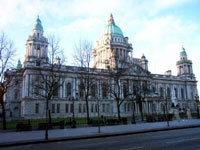
Photo credit: www.sxc.hu
Belfast is situated near the mouth of the River Lagan, and blossomed in the 17th century with an influx of English and Scottish settlers. The port city grew in prominence during the Industrial Revolution, with booming linen, rope-making, and shipbuilding industries. The ill-fated Titanic was built here in the Harland and Wolff shipyards, and today Belfast still boasts the world's biggest dry dock, as well as a restored Waterfront Complex that houses chic restaurants, shops, and ubiquitous Irish pubs.
Much of the city's architectural heritage was destroyed during repeated bombings in World War II, as well as during The Troubles: a period of civil conflict between Roman Catholic nationalists and Protestant unionists that raged from 1969 until the late 1990s. Several exquisite Victorian and Edwardian buildings still remain and have been filled with trendy bars, boutiques, galleries, museums, and restaurants in an attempt to regenerate the city's image. Evidence of The Troubles can still be seen in the many murals that line Falls Road and Shankill Road, and the Europa Hotel has become famous as one of the most-bombed buildings in Europe, having being targeted no less than 33 times.
Belfast is often overlooked as a tourist destination, but its fascinating history, ongoing struggles, numerous attractions, and, above all, the warmth and acerbic wit of its inhabitants, make it an interesting stop on any tour of the United Kingdom. It also serves as an excellent base from which to explore the many natural wonders of Northern Ireland.
Climate in Belfast
Typical of Ireland as a whole, Belfast has a temperate climate, with a narrow range of fairly mild temperatures and plenty of rainfall all year. In summer, between June and August, average temperatures range between 49F (9C) and 66F (19C). Although rain is possible at any time of year, the summer months are slightly less rainy than the rest of the year. June is the driest and the sunniest month and July is generally the warmest. In winter, between December and February, average temperatures range between 37F (3C) and 46F (8C). November, December and January are the wettest months. The city seldom gets snow, with an average of less than 10 snowy days a year.
The best time to visit Belfast is between April and August, when the city is least wet and overcast. October is a good month to visit for culture vultures, as this is when the Belfast Festival (the second biggest arts festival in the UK behind Edinburgh) is held. Around the 12 July every year some Protestant marches and parades are held in Belfast; the marches are usually peaceful nowadays, but it is still a tense and potentially violent period in the city and travellers tend to avoid it.
Sightseeing in Belfast
Belfast is a great place for travellers to enjoy sightseeing, as the layout of the city and its public transport make it easy for visitors to get from the centre of Belfast to the surrounding suburbs within 20 minutes, even during rush-hour. Moreover, many of Northern Ireland's most famous and worthwhile sightseeing attractions are just a short drive outside of the city.
Visitors can take a trip to City Hall and admire the turn-of-the-century British architecture and the memorial to the victims of the ill-fated Titanic (which was built in Belfast), and a statue of Queen Victoria. They can also head to the trendy Cathedral Quarter, where the beautiful St Anne's Cathedral provides a wonderful backdrop for the small shops, boutiques, galleries and eateries lining the streets around it, and take in the magnificent architecture in the area that is marketed as Belfast's 'cultural' district.
For a more relaxing day of sightseeing, travellers can visit the Botanic Gardens with a book and a packed lunch, and then head to Falls Road or Shankill to see some of the world's finest political murals. Animal lovers should visit the Belfast Zoo to meet the famous prairie dogs that run free around the zoo's grounds as well as many other exotic and endangered animals; and opera lovers will be thrilled at the opportunity to visit the Grand Opera House for a tour or a performance.
Belfast Attractions
Cathedral Quarter

Photo credit: Recycled Alien
Website: http://www.cathedralquarterbelfast.com
Belfast Botanic Gardens and the Ulster Museum
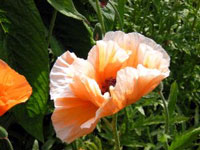
Photo credit: www.sxc.hu
Website: http://www.nmni.com/our-museums/ulster-museum/
Belfast Zoo

Photo credit: www.sxc.hu
Website: http://www.belfastzoo.co.uk
St George's Market
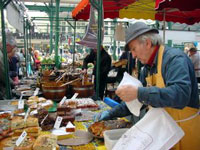
Photo credit: www.sxc.hu
Website: https://visitbelfast.com/partners/st-georges-market/
Giant's Ring
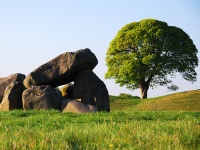
Photo credit: robertpaulyoung
Website: http://www.nationaltrust.org.uk/minnowburn/trails/minnowburn-giants-ring-trail
Ulster American Folk Park
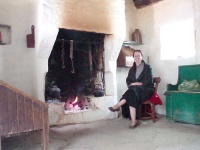
Photo credit: Liam Hughes
Website: http://www.nmni.com/our-museums/ulster-american-folk-park/
St Anne's Cathedral

Photo credit: Ross
Website: http://www.belfastcathedral.org
Giant's Causeway
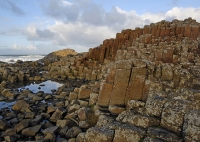
Photo credit: Dave Green
Website: http://www.nationaltrust.org.uk/giants-causeway/
Carrick-a-Rede Rope Bridge
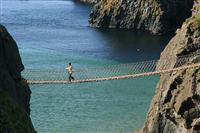
Photo credit: Supermac1961
Website: http://www.nationaltrust.org.uk/carrick-a-rede/
Events in Belfast
Belfast Marathon
Sunday May 03, 2020 (3 May 2020)
Where: From City Hall to Ormeau Park
For more than 30 years, the Belfast City Marathon has attracted thousands of participants and spectators. These days the race, always run on May Day, attracts more than 20,000 participants, and is very well supported by spectators. As well as a full marathon, there is also a walk, wheelchair race, team relay race, and a fun run. Don't miss the pre-marathon Pasta Party at City Hall, where participants can carbo-load and enjoy traditional Irish music and dance. The marathon begins at City Hall and ends at Ormeau Park. There was a brief attempt to change the route some years back, to make it a flatter run, but the change met with huge resistance because the new route by-passed some of the best spectator streets, lessening the party atmosphere of the marathon - the traditional route was quickly reinstated. A glance at the winner's list for the Belfast Marathon reveals the growing internationalism of the event, as the recent winners have hailed as much from Africa and Europe as the UK. The full name of the event is Deep RiverRock Belfast City Marathon.
http://www.belfastcitymarathon.com
Belfast Film Festival
Wednesday April 01, 2020 to Thursday April 09, 2020 (TBC)
Where: Various
The annual Belfast Film Festival is a must for cinephiles and offers a range of exciting films, a short film competition for up and coming filmmakers, and plenty of sneak previews. The festival showcases the best in local cinema but also choice international films. The organisers aim to be provocative as well as entertaining, determined to make the festival a platform for debate tackling the religious, cultural, and social issues in Northern Ireland and the world.
They are delightfully innovative and creative with their choice of venues, with past screenings taking place on boats, in historic buildings, and even on the Thompson dry dock from which the Titanic departed. A festival pass is available which offers a massive discount and access to all the films on offer. Tickets can be booked online via the official website, where the full programme can also be found. The organisers also screen the odd film during the rest of the year, pairing classics with atmospheric venues. Movie-lovers should check what's showing during their visit.
http://www.belfastfilmfestival.org
Belfast Pride
Sunday July 26, 2020 to Tuesday August 04, 2020 (TBC 2020)
Where: Various
Celebrating the diversity, history, and culture of Northern Ireland's gay and lesbian communities, the annual Belfast Pride festival is a riot of colours and sounds. There is a range of events on offer, from walks to river cruises, talks, photographic exhibitions, parties and shows, all culminating in the festive Pride Parade through the streets of downtown Belfast. Belfast Pride is Ireland's largest gay festival, now attracting about 35,000 people onto the streets of the city to celebrate and support the LGBTQ community.
The Custom House Square is one of the main sites for entertainment and festivities, but Belfast is strewn with venues hosting special events during Pride. A Pride Village has recently been established just opposite the Custom House Square, with lots of fun activities and attractions. The event is careful to strike a good balance between protest and celebration, as the fight for equality for the gay community in Northern Ireland is far from over. Of course, Pride is also a huge party, and every year a fun theme is established, prompting much dressing up. For details on the event check out the official website listed below.
http://www.belfastpride.com
Airports in Belfast
Belfast International Airport (BFS)
Belfast International Airport
http://www.belfastairport.com
Location: Belfast The airport is situated 14 miles (22km) northwest of Belfast.
Time: Local time is GMT (GMT +1 between the last Sunday in March and the Saturday before the last Sunday in October).
Contacts: Tel: +44 28 9448 4848.
Getting to the city: The Airport Express operates between the airport and the city centre every 15 minutes from outside the terminal building, 24 hours a day. The International Airport Taxi Company offer taxis outside the right hand door of the airport exit lobby with a list of fares displayed in the exit hall of the terminal.
Car rental: Car rental companies include Avis, Budget, Hertz, and National and can be found in the Arrivals hall.
Airport Taxis: International Airport Taxi Company offer taxis outside the right hand door of the airport exit lobby with a list of fares displayed in the exit hall of the terminal. The journey takes around 25 minutes.
Facilities: Facilities at the airport include bureaux de changes, ATMs, WiFi, duty-free shopping, a travel agent, a business lounge, an information desk, and a variety of shops and restaurants. Passengers with disabilities are well catered for.
Parking: There are four parking options at Belfast International Airport: short-stay parking, the main car park, long-stay parking, and park and fly.
Departure Tax: None. 2762.7
Belfast City Airport (BHD)
George Best Belfast City Airport
http://www.belfastcityairport.com
Location: Belfast The airport is situated five miles (8km) east of Belfast.
Time: Local time is GMT (GMT +1 between the last Sunday in March and the Saturday before the last Sunday in October).
Contacts: Tel: +44 28 9093 9093.
Getting to the city: Approved taxis are available outside the terminal building. The Airport Express 600 bus service departs every 30 minutes from the airport terminal to the Belfast Europa Bus Centre in the heart of the city.
Car rental: Car rental companies include Avis, Budget, Hertz, Europcar, and Sixt.
Airport Taxis:
Facilities: Airport facilities include ATMs, bureau de change, wireless Internet, restaurants, and shops. Passengers with disabilities are well catered for.
Parking: Short-term and long-term parking is available at the airport.
Departure Tax: None.
Northern Ireland Attractions
Overview
Although Northern Ireland is perhaps best known to travellers for its beautiful rural countryside and pretty coastline, the cities also have charm: industrial Belfast and the 17th-century walled city of Derry are two of the most popular urban destinations in Northern Ireland and are both great travel hubs for tourists. Northern Ireland is delightfully compact, meaning that the distance between sightseeing attractions tends to be small; a rare advantage when looking at the top attractions in a country and trying to plan an itinerary!
Belfast is an interesting city, once one of the major powerhouses of the Industrial Revolution, and a cauldron of political strife for many decades. The city is undergoing a wholesale rejuvenation, centring on the trendy Cathedral Quarter, famous for its performing arts venues and vibrant nightlife. The charming old city of Derry is less than two-hours drive from Belfast, and boasts many museums and historic sites of its own.
Those staying in Belfast can make quick excursions to a number of wonderful sites, including Giant's Causeway, on the scenic Antrim Coast, which is generally lauded as Northern Ireland's top tourist attraction. Whiskey lovers visiting Giant's Causeway should also be sure to detour to the nearby Bushmills Distillery, in the town of Bushmills, which is the oldest licensed whiskey distillery in the world. Another gem near Belfast is the mysterious Giant's Ring, a Neolithic henge that many visitors will find fascinating. Lastly, the delightfully scary Carrick-a-Rede rope bridge, which offers splendid views, is also only a short drive from the city.
Cathedral Quarter

Photo credit: Recycled Alien
Website: http://www.cathedralquarterbelfast.com
Belfast Botanic Gardens and the Ulster Museum

Photo credit: www.sxc.hu
Website: http://www.nmni.com/our-museums/ulster-museum/
Belfast Zoo

Photo credit: www.sxc.hu
Website: http://www.belfastzoo.co.uk
St George's Market

Photo credit: www.sxc.hu
Website: https://visitbelfast.com/partners/st-georges-market/
Giant's Ring

Photo credit: robertpaulyoung
Website: http://www.nationaltrust.org.uk/minnowburn/trails/minnowburn-giants-ring-trail
Ulster American Folk Park

Photo credit: Liam Hughes
Website: http://www.nmni.com/our-museums/ulster-american-folk-park/
St Anne's Cathedral

Photo credit: Ross
Website: http://www.belfastcathedral.org
Giant's Causeway

Photo credit: Dave Green
Website: http://www.nationaltrust.org.uk/giants-causeway/
Carrick-a-Rede Rope Bridge

Photo credit: Supermac1961
Website: http://www.nationaltrust.org.uk/carrick-a-rede/
News about Northern Ireland
- A Cruise Ship Bound on a Round-The-World Voyage Leaves Belfast After a 4-Month Delay
-
A cruise ship taking passengers on a 3 ½-year around-the-world voyage finally sailed from Belfast’s dockside, after spending four months stuck in the Northern Ireland capital. Passengers cheered, applauded and hugged the liner’s chief when he confirmed on Monday night that they were ready
- Cruise Passengers Stranded in Belfast for Almost Three Months
-
Passengers on a round-the-world cruise have been left stranded in Belfast for three months after their voyage was beset by delays. Villa Vie Residences' Odyssey arrived at Queen’s Island in the Northern Ireland capital to be outfitted before it was scheduled to leave on 30 May for the first leg of a three
- Airline Apologizes After Plane Left Passengers in Wheelchairs on Tarmac
-
Liz Weir arrived at Belfast International Airport several hours early last Friday, determined not to miss her flight to Edinburgh, Scotland. The trip from Northern Ireland was just a short 30-minute hop, but Weir, a writer, was anxious to ensure she wouldn’t miss an event she was
- Flooding hits Northern Ireland as people urged not to travel
-
An amber warning for heavy rain was in place overnight for counties Armagh, Antrim and Down
- UK to Institute Travel Authorization Form and Fee for Inbound Travelers
-
US travelers to the United Kingdom will have one more hoop to jump through beginning next year, as the new Electronic Travel Authorization (ETA) becomes mandatory. The UK announced yesterday that all visitors to England, Scotland, Wales and Northern Ireland
- 7 Destinations in the U.K. Where Locals Love to Travel
-
The U.K. has incredible variety. From chocolate box villages and royal palaces to wild mountainous landscapes and some of the most gorgeous coastline in the world, it’s a wonder anyone who lives in England, Wales, Scotland, and Northern Ireland ever goes abroad. Though
- Ireland's travel secrets: Glenelly Valley, Co. Tyrone
-
Glenelly Valley is the longest valley in the Sperrin Mountains in County Tyrone and is regarded as one of Northern Ireland’s most idyllic and dramatic landscapes.
- Is it safe to travel to Spain?
-
Just two weeks after the UK government gave the all-clear for travellers to visit Spain without the need to quarantine for two weeks upon their return to England, Northern Ireland and Wales, the popular holiday destination is struggling with a wave of new outbreaks of coronavirus.
- A women-only surf break on Northern Ireland’s Causeway Coast
-
Icouldn’t feel my hands, and my feet were flopping around in soaked wetsuit boots as I walked from the sea to a small changing shack on the beach at Benone Strand in County Derry. The walk marked the end of my introduction to cold-water surfing at a location with seven miles of sand and lovely views of Donegal but a far cry from the temperatures I’d been used to while surfing in Morocco
- Ambitious Game of Thrones Tourist Attraction Proposals Unveiled
-
HBO, the US television network behind Game of Thrones, has unveiled ambitious proposals to celebrate the show’s legacy by converting some of the film locations used across Northern Ireland into tourist attractions. Also in prospect is the creation of a studio tour and visitors experience at Linen Mill Studios in Banbridge, enhanced by state-of-the-art digital content
- 10 Hidden-Gem Attractions in the United Kingdom
-
Most travelers in the United Kingdom will be familiar with, and probably visit, the British Museum, the National Gallery and the Tate Modern. GoCompare.com sought to unearth the most under-appreciated visitor attractions. The site used visitor attraction data from Visit England, Visit Wales, the Moffat Centre's Visitor Attraction Monitor (Scotland) and Nisra (Northern Ireland) to
- At These Hotels and Spas, Cancer Is No Obstacle to Quality Care
-
It was a big deal for Melanie Kennedy, a former accountant from Bangor, Northern Ireland, to indulge in a massage at the spa at Culloden Estate and Spa, in Belfast, earlier this year. Ms. Kennedy has stage four incurable breast cancer, and getting spa treatments have been a challenge ever since she was diagnosed almost six years ago at the age of 35. The lymph nodes she had removed in her
- Bubble Domes Are the Only Way to Camp in Ireland
-
You don’t need us to tell you Ireland is staggeringly beautiful. It’s idyllic, picture-perfect, everything you’ve read and more, especially when you step away from the tourist-rich hots pots like Dublin and Belfast. However, the island’s best natural experiences are far from the madding crowds in the extreme west or the wilds of Northern Ireland.
- How Derry Became the Best Halloween Destination in the World
-
The best place to celebrate Halloween in the world. It must be Transylvania, the home of Dracula, right? Or Salem, Massachusetts, for its history of witches, right. One place you almost certainly wouldn't think of is Derry – the second city of Northern Ireland. But that's where you'd be wrong
- Lonely Planet Reckons this UK Region is the Best in the World
-
Belfast and the Causeway Coast has been rated best region in the world to visit in the coming year by Lonely Planet. In a boost to Northern Ireland’s international image, the area was rated ahead of Alaska and the Julian Alps of Slovenia in the travel guide publisher’s Best in Travel 2018 awards
- Game of Thrones-Themed Festival to be Launched at National Trust Property in Northern Ireland
-
The one-day festival, taking place on September 24, will be based on the grounds of the 820-acre Castle Ward estate, the National Trust property which filled in for ‘Winterfell’ - the ancestral home of the Stark family for most of season one of the series
- Derry City Guide: What To Do On A Weekend In Northern Ireland's Second City
-
Why go now? Explore a city in the throes of reinvention as Derry bids to become the European Capital of Culture for 2023
- Brexit could mean cheaper holidays in Northern Ireland
-
Tax on tourism and flights in Northern Ireland could be slashed once the UK leaves the EU, an influential committee of MPs said. The hospitality industry pays VAT at a rate more than twice that
- The UK city that's actually affordable
-
A little bit of Britain, a little bit of Ireland and little bit of something completely individual is how residents describe the capital of Northern Ireland
- Travel guide to... Montenegro
-
The phrase "good things come in small packages" may be a cliché, but in the case of Montenegro, it's an adage so apt it should be embroidered on the flag. This tiny corner of south-eastern Europe crams in some of the continent's most glorious beaches, wilderness and historic towns into an area smaller than Northern Ireland
- The best affordable hotels, BampBs and hostels in Ireland
-
Ireland has its grand, expensive hotels but it's possible to get quality, comfort and style at a price you may like too. We round up some of the best places to stay across the Republic and Northern Ireland
- Madagascar's bizarre natural wonder
-
Accessible only by boat and known to few travellers, Organ Pipes bears an uncanny resemblance to Northern Ireland's spectacular Giant's Causeway
- The return of Antrim’s Gobbins Path
-
Northern Ireland’s latest tourist attraction, the Gobbins Cliff Path, is a reboot of a magnificent feat of engineering that originally opened in 1902
- Britain's 20 best beaches
-
The best beaches in Britain and Northern Ireland, including spots on the coasts of Cornwall, Norfolk, Scotland and Wales, with information on watersports, booking accommodation, and where to eat
- Game of Thrones tourism boost for County Antrim
-
County Antrim in Northern Ireland experiences surge in global online interest, new research shows
- 10 of the UK's oldest towns
-
The UK has heritage from top to toe, but nowhere more so than these towns, the oldest in England, Scotland, Wales and Northern Ireland
- A weekend break in... Northern Ireland
-
A guide to short breaks in Northern Ireland, including the best bars, restaurants, hotels and things to do
